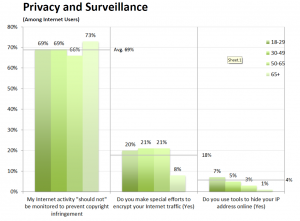 The U.S. House of Representatives is now debating the Stop Online Piracy Act (SOPA)—the counterpart to the Senate’s PROTECT IP Act. If passed, the bill will expand criminal penalties for copyright infringement and give the government (and private parties) new powers to block access to websites accused of facilitating infringement.
The U.S. House of Representatives is now debating the Stop Online Piracy Act (SOPA)—the counterpart to the Senate’s PROTECT IP Act. If passed, the bill will expand criminal penalties for copyright infringement and give the government (and private parties) new powers to block access to websites accused of facilitating infringement.
The bill is the latest in a series of efforts to strengthen copyright enforcement online. Earlier this year, Internet Service Providers and the film and record industries reached an agreement to expand the private policing of online infringement. Search engines, social networking platforms, cloud storage providers, universities, and other institutions face growing pressure to monitor and filter Internet activity.
This research note is an effort to bring American public opinion to bear on this vital conversation. The note excerpts a forthcoming survey-based study called Copy Culture in the U.S. and Germany. Drawing on results from the U.S. portion of the survey, it explores what Americans do with digital media, what they want to do, and how they reconcile their attitudes and values with different policies and proposals to enforce copyright online.
Full Report (PDF: “Copyright Infringement and Enforcement in the USA.” Joe Karaganis, American Assembly, Columbia University. November 2011
The Copy Culture survey was sponsored by The American Assembly, with support from a research award from Google. The content of the survey and its findings are solely the responsibility of the researchers. The U.S. survey was conducted by Princeton Survey Research Associates International. The results are based on interviews on landline and cellular telephones conducted in English with 2,303 adults age 18 or older living in the continental United States from August 1-31, 2011. For results based on the entire sample, the margin of error is plus or minus 2 percentage points.
Full results and data will be available in early 2012.
Preliminary Conclusions
- ‘Piracy’ is common. Some 46% of adults have bought, copied, or downloaded unauthorized music, TV shows or movies.* These practices correlate strongly with youth and moderately with higher incomes. Among 18-29 year olds, 70% have acquired music or video files this way.
- Large-scale digital piracy is rare, limited to 2% of adults for music (>1000 music files in collection and most or all copied or downloaded for free) and 1% for film (>100 files, most or all from copying or downloading).
- Console-based video game piracy is very rare, limited (on any scale) to 1-2% of the population.
- Legal media services can displace piracy. Of the 30% of Americans who have ‘pirated’ digital music files, 46% indicated that they now do so less because of the emergence of low-cost legal streaming services. Among TV/movie pirates, 40%.
- Copyright infringement among family and friends is widely accepted (75% and 56%, respectively, for music; 70% and 54% for film). In contrast, activities that imply dissemination of copyrighted goods to larger networks receive very low levels of support.
- Only a slim majority of Americans (52%) support penalties for downloading copyrighted music and movies—and limit this support to warnings and fines. Other penalties, such as bandwidth throttling and disconnection, receive much lower levels of support.
- Disconnection from the Internet, in particular, is very unpopular, with only 16% in favor and 72% of Americans opposed.
- Among those who support fines, 75% support amounts under $100 per song or movie infringed—hugely undershooting the current statutory penalties.
- For a majority of Americans (54%), due process in such matters requires a court—not adjudication by private companies.
- Solid majorities of American Internet users oppose copyright enforcement when it is perceived to intrude on personal rights and freedoms. 69% oppose monitoring of their Internet activity for the purposes of enforcement. 57% oppose blocking or filtering if those measures also block some legal content or activity.
- Comparable majorities (56%) oppose government involvement in “blocking” access to infringing material. This number increases to 64% when the term “censor” is used.
- Blocking and filtering by commercial intermediaries such as ISPs, social media sites, and search engines receive majority support—until the questions include likely consequences. Majorities of Internet users support requirements that ISPs and search engines “block” infringing material (58% for ISPs; 53% for search engines). This support runs as high as 61% for a soft requirement that user-content driven sites like Facebook “try to screen all material and reject pirated copies of music and videos.” But this majority disappears when blocking by ISPs is characterized as censorship (46% support), falls further when associated with the blocking of legal content (36% support), and still further when it implies surveillance of Internet use (26% support).
- Which scenario best approximates the Stop Online Piracy Act? In our view, ISP blocking that also blocks some legal content. In this case, Internet users oppose blocking: 57% to 36%.




